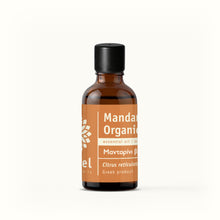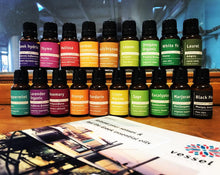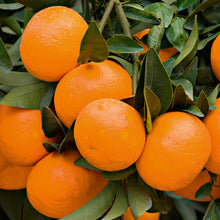Greek Mandarin Organic Essential Oil
Regular price
€4.90
€4.90
Sale
If you are interested in buying larger size quantities we would love to receive your email at info@vessel.gr
Greek Mandarin Organic Essential Oil
Batch: E1002013



Other common names: sometimes referred to as ‘mandarin orange’ or a ‘common mandarin’
Botanical name: Citrus reticulata
Botanical family: Rutaceae
Method of extraction: Expression
Plant part used to extract the oil: fruit peel
Cultivation method: Organic
Area of origin: Greece
Historical notes:
Did you know that citrus fruits may have been the famous ‘golden apples’ in Greek mythology? It is said that citruses were the dowry of Zeus’s bride, Hera, who kept them hidden in the gardens at the ‘western end of earth’ (possibly Atlas Mountains in Morocco). They were guarded by three nymphs - Hesperides (‘Daughters of Evening’). Each nymph safeguarded her own fruit: Aigle tended the citron, Arethusa the lemon and Hesperethusa the orange. In his eleventh labour Heracles stole the fruits – referred to as the ‘golden apples’ – from the garden and gave them to mankind. Is it possible the mandarins were there too…?
Biochemical group: Monoterpene
Main chemical compounds: limonene, β-myrcene, α-pinene
Colour: yellow
Consistency: thin
Aroma strength: medium
Perfumery note: top
Aroma: our mandarin essential oil has a very fruity aroma – it will make your mouth water and it will bring a smile to your face! It is the sweetest of the citrus peel oils and it smells just like a torn mandarin rind – fresh and citrusy, refreshing and uplifting. It retains the sweet fruity characteristic as the dry out progresses.
Traditional aromatherapy uses:
- Traditionally in aromatherapy treatments mandarin essential oil is associated with the following therapeutic properties: antiseptic, antispasmodic, carminative, digestive, diuretic (mild), laxative (mild), sedative, stimulating to the digestive and lymphatic systems, tonic.
- Qualified aromatherapists may use mandarin essential oil for common complaints such as:
- skin conditions: acne, dull, oily skin, scars, spot; traditionally used in skin care products to prevent stretch marks in pregnancy
- digestive system: tonic to the digestive system, eases flatulence, aids bile production and assists in digestion of fats
- nervous system: soothing, gently calming/sedative
- emotional uses: depression, anxiety
- How we use it:
Please, also see our How to Use Essential Oils Safely page for more information.
- For an oily skin face cream – add some mandarin essential oil to a fragrance free base cream. Try combining with some Organic Lavender essential oil.
- For a body lotion and stretch marks - add to an unscented body lotion or cream
- To support digestion or ease flatulence/constipation – dilute together with a drop of Peppermint essential oil in a fixed oil (carrier oil) and gently massage the lower abdomen in a clockwise direction.
- Vapourise to create a soothing, calm and positive ambience, try combining with Sweet orange essential oil and/or Organic Lavender essential oil for an evening wind down.
- For children suffering from colic and/or hiccups – vapourise a couple of drops in the room
- For depression and/ or anxiety sniff a couple of drops from a tissue.
Safety considerations:
Tisserand and Young recommend careful storage, preferably in a refrigerator. The use of old/oxidized Mandarin essential oil should be avoided to prevent skin sensitization. Tisserand and Young confirm that Mandarin essential oil not phototoxic. Reading Tisserand and Young's full profile is recommended. [Robert Tisserand and Rodney Young, ‘Essential Oil Safety’ (Second Edition. United Kingdom: Churchill Livingstone Elsevier, 2014), 87, 342-343.]
Please, also see our How to Use Essential Oils Safely page for more information.
Research and studies:
- Chemical composition of commercial citrus fruit essential oils and evaluation of their antimicrobial activity acting alone or in combined processes
https://www.sciencedirect.com/science/article/pii/S0956713510003944
- Antifungal activity of lemon (Citrus lemon L.), mandarin (Citrus reticulata L.), grapefruit (Citrus paradisi L.) and orange (Citrus sinensis L.) essential oils
https://www.sciencedirect.com/science/article/pii/S0956713507002629
Margaret Pawlaczyk-Karlinski MSc. (Hons.), Cert. Ed., M.I.F.A., NHS reg.







